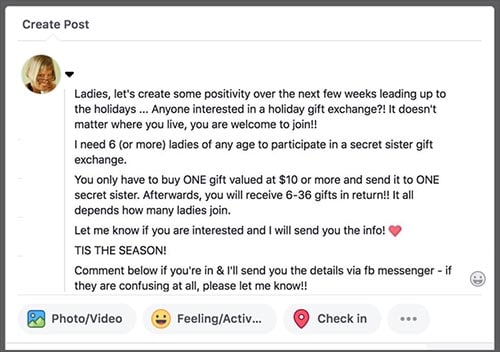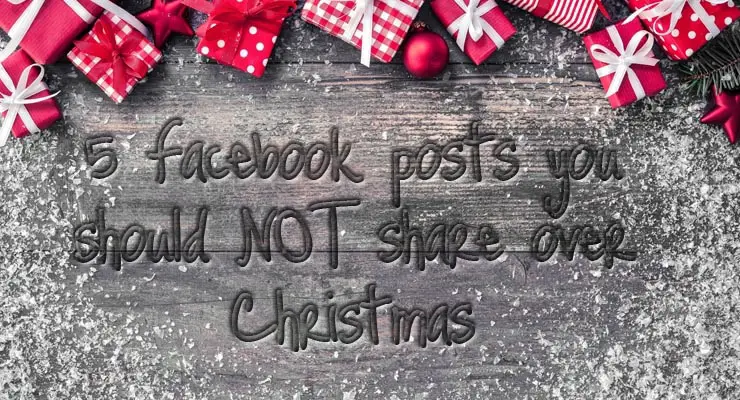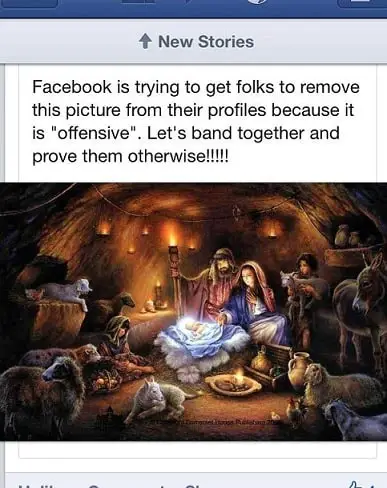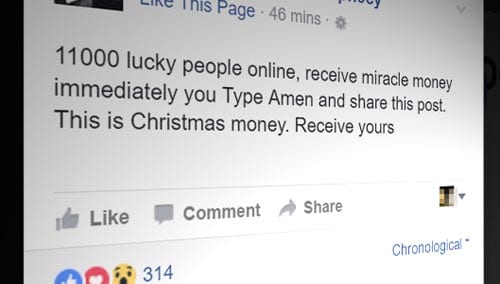5 Facebook posts you SHOULD NOT be sharing over Christmas
As Christmas approaches, we will be seeing plenty of nonsense proliferating on social media, specifically Facebook. Much of this nonsense will be making repeat appearances, so here we list five Facebook posts you should NOT be sharing as the big day draws near.
Christmas “Like & Share” Competitions
We know that many companies do turn to social media for festive themed competitions and promotions, but these will be companies you already know (for example local companies) or larger companies that have Facebook’s verified blue tick.
That is to say, if a Facebook page is not ‘blue ticked’ brand and not a local company you recognise, and they’re offering expensive prizes for liking and sharing a Facebook page (such as trips to Lapland, expensive “Christmas giveaways”, free cruises etc.) then it’s almost certainly going to be a scam.

These scams are usually designed to lure you to data-sucking spam websites after your details in order to bombard you with spam. Sometimes these fake competitions can be used to lure you into handing over your payment details so you can receive your “prize”.
Watch out for the following red flags.
– Pages without a verified blue tick but claim to be from big brands, or pages with generic names (e.g. Mystery Christmas Santa).
– Newly created pages or pages posting little content. (Use Facebook’s Transparency Tool to see how new a page is.)
– Is the page trying to lure you into clicking a link to a website you don’t recognise? Is that website asking for lots of your details? Has the website switched the prize? Again, these are big red flags.
– Does the competition appear too good to be true?
To learn more about fake competitions, you can click here.
Facebook are removing Christmas images
As with every year, we see photos or images depicting the Christmas nativity scene fly across Facebook along with the assertion that Facebook find the image offensive and are actively trying to remove it (see below).
It’s not true. Facebook have a terms of service that does not prohibit religious images or scenes (or anything related to Christmas) unless they violate another particular condition. So no matter what image Facebook are apparently trying to remove, it’s most probably a hoax.
Sponsored Content. Continued below...
“Recovering Soldier” Christmas card Facebook posts

Despite being hopelessly outdated, we still see requests to send Christmas cards to injured US army personnel spread online that urge readers to send their Christmas cards to Walter Reed Medical Base addressed to “A Recovering Soldier”. Please do not spread such requests as they will not result in holiday mail reaching anyone. The Walter Reed Medical Base that is often quoted in these messages no longer exists, and was re-opened elsewhere.
Additionally they do not accept envelopes with no specific recipient, and the US postal service is not likely to send them without a recipients name. There are a number of charities that allows holiday mail to reach wounded soldiers, and readers are encouraged to use one of these instead of sending Christmas cards directly.
We discuss this in more detail here.
Gift exchange or “Secret Sister Gift Exchange” programs

Gift exchange “programs” are very popular at this time of year. They promise the return of dozens of gifts in exchange for one. For example, a popular example known as the “Secret Sister Gift Exchange” instructed participants to purchase 1 gift valued at $10 and send it to a “secret sister” and in return you would receive 36 gifts in return, providing you recruited six other “sisters” to the same scheme.
Seem too good to be true? That’s because it is. It’s a pyramid scheme where you send a gift to the person who recruited the person who recruited you. Then you recruit 6 others, who each recruit 6 others each (36 people) who then send their gifts to you.
The problem is, pyramid schemes are not sustainable. Around 90-95% of people involved eventually lose out since it cannot continue to absorb new recruits. We discuss it in more details here.
Sponsored Content. Continued below...
Christmas Amen Requests
Facebook like-farming posts that attempt to lure you into engaging with them by exploiting you with the link between Christmas and religion are particularly prolific at this type of year. These posts attempt to tug at the heartstrings and use that exploitation to lure social media users into typing ‘Amen’.
However these posts regularly include photos of injured or disabled children without their permission and are trying to lure Facebook users into helping a post go viral across social media, which ultimately benefits the spammers.
We’ve seen a rise in posts purporting to offer “Christmas miracles” for those that type amen on a post, as well as others that capitalise on the connection that Christmas has with religion.
Again, this is simply exploitation. Scammers are trying to get their posts to go viral across social media, and have little regard to the people they manipulate or deceive along the way.
Continued below...
Thanks for reading, we hope this article helped, but before you leave us for greener pastures, please help us out.
We're hoping to be totally ad-free by 2025 - after all, no one likes online adverts, and all they do is get in the way and slow everything down. But of course we still have fees and costs to pay, so please, please consider becoming a Facebook supporter! It costs only 0.99p (~$1.30) a month (you can stop at any time) and ensures we can still keep posting Cybersecurity themed content to help keep our communities safe and scam-free. You can subscribe here
Remember, we're active on social media - so follow us on Facebook, Bluesky, Instagram and X


